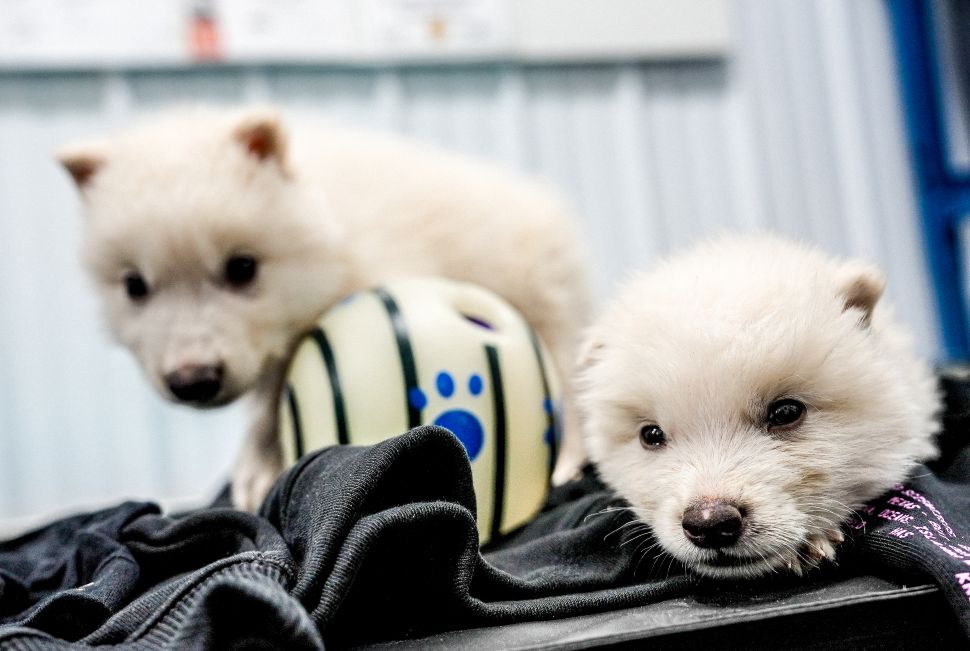What weighs 80 pounds, relies on a daily diet of beef, deer and horse meat, and displays a distinctly snowy fur coat? The answer, according to the Texas-based Colossal Biosciences, is a six-month-old dire wolf, a canine species that has been extinct for more than 12,000 years. But scientists have a different name for the three wolf pups that Colossal has managed to breed after genetically engineering ancient dire wolf DNA into genomes of grey wolves, their closest living relatives.
“I think that maybe ‘dirish’ wolves might be the best way to describe them,” Hank Greely, a bioscience expert and law professor at Stanford University, told Observer. “It’s a grey wolf with some genes modified in the dire wolf direction.”
Colossal’s wolf litter includes Romulus and Remus, two six-month-old male pups, and a female two-month-old pup named Khaleesi. They were born to surrogates after Colossal extracted ancient DNA from a dire wolf tooth and inner ear bone fossil and made 20 edits to grey wolf genomes to imbue them with dire wolf traits. As opposed to their smaller counterparts, dire wolves were around 25 percent larger and known for their pale coats, strong jaws and wide heads, said the startup, which claims to have brought back “the world’s first successfully de-extincted animal.”
Genetically, the pups aren’t true dire wolves. But do they represent a successful step forward for Colossal, which was founded in 2021 by geneticist George Church and entrepreneur Ben Lamm with a mission of reviving long-extinct species. Up until now, the startup’s work has largely centered around ambitious projects to bring back the woolly mammoth, dodo bird and thyacline or Tasmanian tiger.
Using its gene-editing technology on dire wolves was a smart decision, according to Greely. For one thing, a wolf’s gestation period is just over two months, whereas that of an Asian elephant—the closest living relative to the woolly mammoth—is a staggering 22 months. On the whole, the complications Colossal will have to tackle with woolly mammoth surrogates are far greater. “We understand wolf reproduction and dog reproduction a lot better than elephant or mammoth reproduction,” he said.
It also helps that the general public has become familiarized with the appearance of dire wolves through the HBO series Game of Thrones—a fact that is not lost on Colossal, which named its female wolf cub after one of the show’s main characters.
In fact, George R.R. Martin, the author of the series, is also an investor in the company, which was valued at $10.2 billion in January. “I get the luxury to write about magic, but Ben and Colossal have created magic by bringing these majestic beasts back to our world,” said Martin in a statement.
Experts in ancient DNA, however, are less eager to praise the startup’s litter as magical. “There are reasons to want to functionally validate changes that we see in ancient genomes to try and understand what extinct species look like,” Kevin Daley, a paleogeneticist at University College Dublin, told Observer. But these achievements shouldn’t be conflated with de-extinction, added Daley, who said he wishes Colossal’s announcement was accompanied with more scientific data outlining their process and findings.
One thing’s for sure: Romulus, Remus and Khaleesi are being closely watched over by Colossal, which said the pups are living on a 2,000-acre ecological preserve in North America that is continuously monitored by drones, live cameras and security personnel. In addition to employing ten full-time staffers to look after the wolves, the startup’s preserve includes an on-site vet clinic and outdoor storm shelter.
Another section of the preserve is also home to four red wolf pups cloned by Colossal, which is simultaneously exploring how its technology can aid in preserving genetic diversity across animal species that are currently endangered. The red wolf is currently listed as critically endangered, with less than 20 remaining in North America. While there are no plans to release Colossal’s red wolf pups, the startup hopes to eventually work with the U.S. government to re-wild the species.
Although some experts may find Colossal’s mission statement to be overhyped, they note that the startup’s potential to educate and generate more interest in animals, conservation and nature shouldn’t be understated. “I think it could help excite some people about biology and ecosystems,” said Greely of the company’s new “dirish” wolf pups. Even though they’re not true dire wolves, their appeal is undeniable, he added. “Man, those wolves are cute.”

